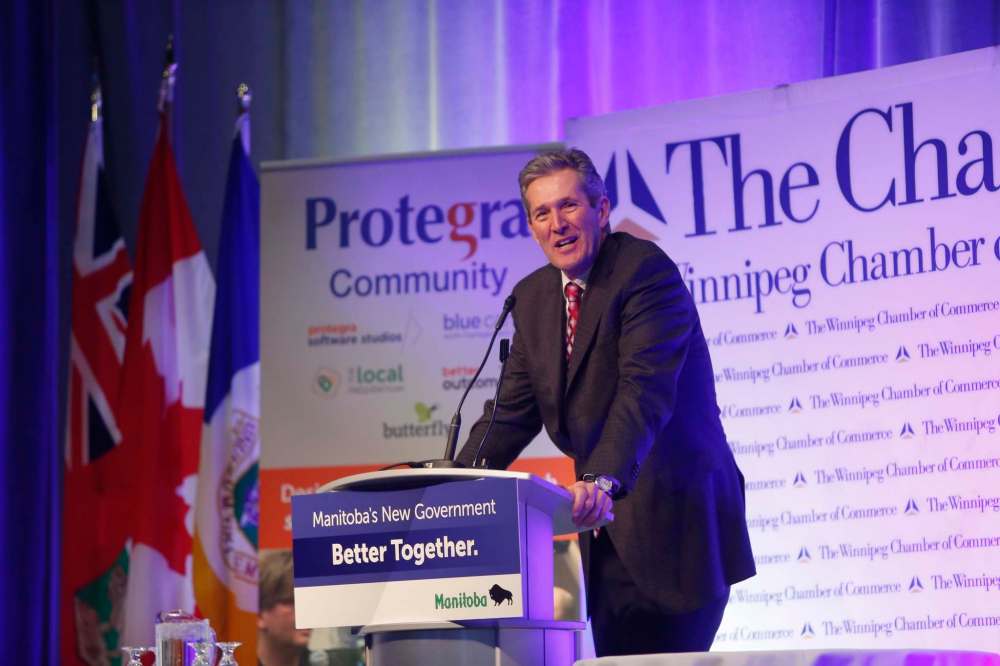Premier promises ‘Manitoba miracle’
Pallister targets health-care unions, vows to rebuild economy during state-of-the-province address
Advertisement
Read this article for free:
or
Already have an account? Log in here »
To continue reading, please subscribe:
Monthly Digital Subscription
$19 $0 for the first 4 weeks*
- Enjoy unlimited reading on winnipegfreepress.com
- Read the E-Edition, our digital replica newspaper
- Access News Break, our award-winning app
- Play interactive puzzles
*No charge for 4 weeks then billed as $19 every four weeks (new subscribers and qualified returning subscribers only). Cancel anytime.
Read unlimited articles for free today:
or
Already have an account? Log in here »
Hey there, time traveller!
This article was published 07/12/2016 (2695 days ago), so information in it may no longer be current.
Premier Brian Pallister chose a large friendly business audience Thursday as the launch pad of a new challenge to organized labour.
Pallister said there are too many union bargaining units in Manitoba’s health sector — 169 — and he’d like to see the process streamlined to make it more efficient for both government and labour.
Reducing the number of bargaining units would save time and money for both sides, he said.

“I need our union bosses to understand that this is a positive endeavour that will help their own people.”
The premier made the comments in the annual state-of-the-province address hosted by the Winnipeg Chamber of Commerce.
His new initiative caught union leaders by surprise. None reached by the Free Press Thursday had heard of Pallister’s concern about there being too many health-care contracts.
“I think the labour movement as a whole feels that we’re not being part of a conversation. That we’re being talked about but not being talked to. And we’d like to change that,” said Manitoba Federation of Labour president Kevin Rebeck.
Pallister’s first state-of-the-province address since being elected April 19 drew a record crowd for the event — from 1,200 to 1,300, organizers said.
The premier, a one-time chamber of commerce president in Portage la Prairie, was in friendly territory, appearing relaxed and at times speaking passionately about the province, its fiscal challenges and his ambitions for it.
“We will fix the finances together. We will repair the services together. We will rebuild the economy together. I need you to help — all hands on deck. This is our focus, this is our commitment. This is our responsibility,” he told the audience.
“In four years, we will be Canada’s most improved province, and in eight years, people from all over the world will look at us and say, ‘That was the Manitoba miracle.’”
Except for his statements about health-care union representation and the announcement of a new panel to advise him on jobs and economic development, Pallister stuck to familiar themes in his 35-minute speech.
He spoke about the need for government to control spending, hold the line on tax increases, enhance services and improve the climate for business. He talked about developing the north’s untapped potential and vowed to take steps to “address the financial burden on our low-income families and those living in poverty.”
He said one of the consequences of having 169 health-care bargaining units is they have produced 47 different bereavement-leave provisions.
“Can you imagine trying to administer that?” he asked the crowd. “Your uncle passes on, and you want to go to the funeral, but your wife can’t go. She’s under a different bereavement provision. Surely, we can work together to make these systems simpler and more effective to benefit the people who work on our front lines.”
“I believe we can and I’m asking our union leaders to help me in that endeavour.”
The large number of health union contracts in Manitoba is unique to Western Canada, the premier said. In Saskatchewan, Alberta and British Columbia combined there are fewer than 20 bargaining units in the health sector, he said.
While Pallister later suggested he had previously alerted union officials — at least informally — about his desire to streamline union representation in the health field, labour reps said it was news to them.
There are about a half-dozen unions in Manitoba that represent health-care workers, Rebeck said.
He said workers must be allowed to choose which unions they join.
“When workers want to organize, the law lets them organize to the union that they wish,” he said.
NDP MLA Wab Kinew, who attended the speech, said Canada’s constitution protects collective bargaining, and workers should be left to determine for themselves who will represent them.
He said the Progressive Conservative government has been attacking organized labour for months, passing legislation that unions believe will make it more difficult to certify workplaces and serving notice he wants to reduce wages already agreed to in existing collective agreements.
“I think what you’re seeing is the premier start to lay out the true agenda, which is focused on austerity … on the backs of public-sector employees,” Kinew said.
Meanwhile, Pallister said he had no specific number in mind as to how many health-care bargaining units there should be in Manitoba.
Asked what he would do if the unions don’t co-operate, the premier said, “That’s hypothetical.”
Then he added: “I don’t see that happening.”
larry.kusch@freepress.mb.ca
nick.martin@freepress.mb.ca

Larry Kusch
Legislature reporter
Larry Kusch didn’t know what he wanted to do with his life until he attended a high school newspaper editor’s workshop in Regina in the summer of 1969 and listened to a university student speak glowingly about the journalism program at Carleton University in Ottawa.
History
Updated on Thursday, December 8, 2016 2:19 PM CST: Updates




